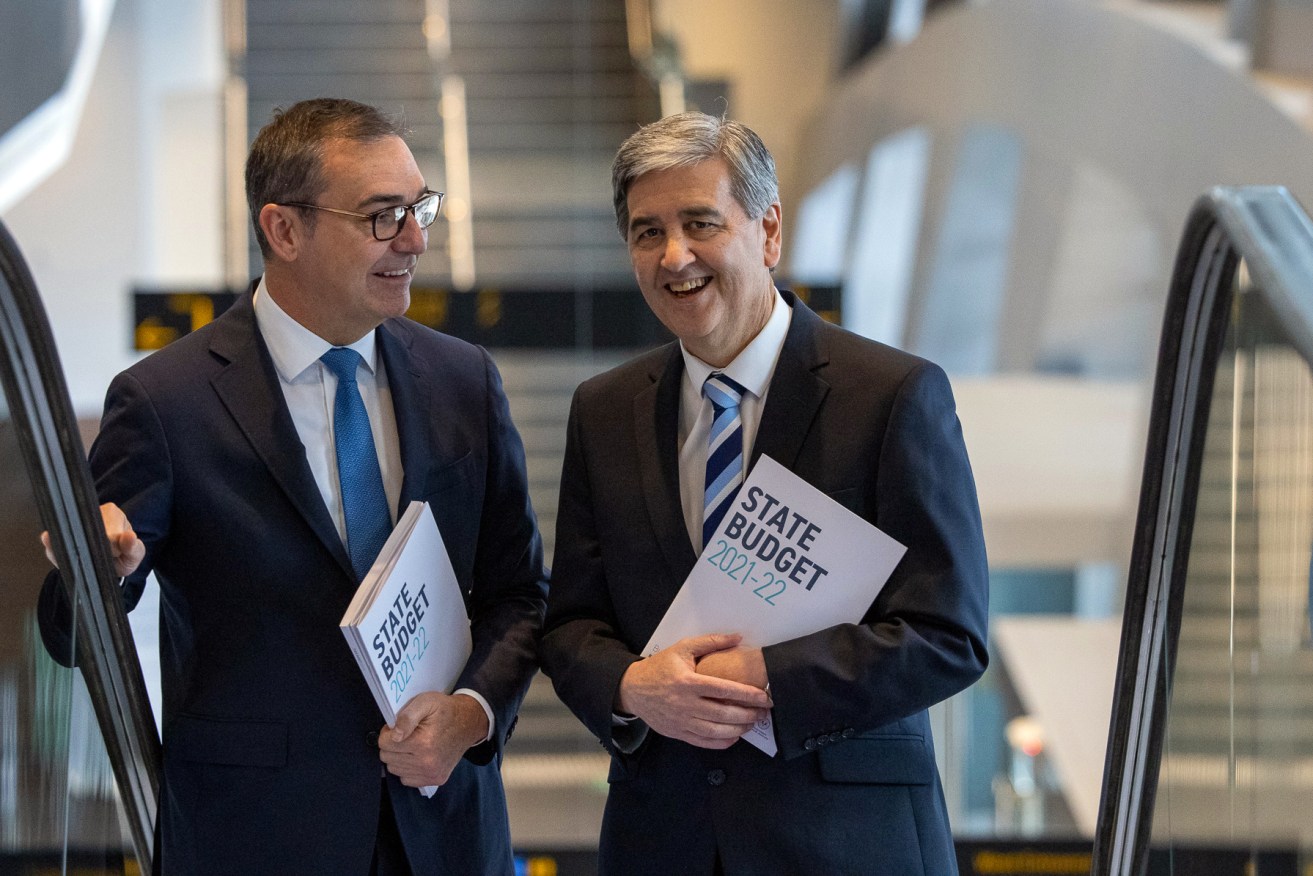No budget plan for RAT rollout, parliament told
There was no budget allocation for the provision of rapid antigen tests when the Marshall Government handed down its mid-year budget review just last month – because “they weren’t part of the conversation at that point in time”, parliament has been told.

Steven Marshall and Treasurer Rob Lucas on budget day. Photo: Tony Lewis / InDaily
The Government legalised the sale of the COVID home-testing kits just before Christmas, with Premier Steven Marshall at the time saying there were “millions of test kits already here in South Australia”.
However, the state’s Treasury Department CEO David Reynolds today told parliament’s Budget and Finance Committee there was no budget allocation for the purchase of rapid antigen test kits when the mid-year budget update was handed down – just ten days earlier.
Asked by Labor committee chair Kyam Maher today “what provision has been made in terms of finances for the government purchasing RATs”, Reynolds replied: “Certainly nothing in the mid-year budget review because they weren’t part of the conversation at that point in time.”
“Since then the Government has entered into at least one, probably multiple contracts in fact with different suppliers, to purchase RATs – and will continue to do that through the next couple of months,” he said.
Reynolds estimated “probably around $20 million” had been spent on RAT supplies since last month.
It follows weeks of short community supply of the in-demand test kits, with pharmacies and supermarkets regularly reporting stock shortages, and the Government now providing two tests for registered close contacts at collections sites, with four to be in operation from tomorrow.
Reynolds said the Government estimated each test cost it “about $5”, but that “there’s various types of RATs”, with kits for individual use “slightly cheaper than that and ones that can be used for medical purposes that are a bit more expensive”.
“So that’s an average kind of number,” he said.
Asked why the Government “didn’t allow their use until very late December”, he said: “We didn’t have as many positive cases during that period.”
“The health evidence has been very clear the use of RATs is not as much use when there are low numbers of COVID cases, because you tend to get more false positives,” he said.
“The PCR testing is much preferred as a strategy when you have a lower number of cases [but] when the cases get to a higher number, it’s worth doing RATs to get a better sense of the number of cases across your community.”
Reynolds denied advising Marshall that there were “millions” of RATs stockpiled in SA by late December, with SA Health representatives telling the committee last week that they provided no such advice either.
He said he was aware that supermarkets and pharmacies had tests waiting in “distribution warehouses”.
“I didn’t provide a number but I was aware they had stocks,” he said.
Reynolds said of an additional $393 million added to the health budget earmarked for COVID spending in the last year, all but $14 million had already been spent at the time of the mid-year budget review.
He said while some aspects of ongoing funding, such as the use of medi-hotels, would be expected to taper off in coming months, additional unforeseen demands prompted by the Omicron outbreak would likely see the spend increase beyond the budgeted estimate.
Reynolds also shed light on the state’s COVID-Ready committee, chaired by Marshall, which meets daily in place of the Transition Committee, which has not been disbanded but has not met for several weeks.
Under questioning from MPs, Reynolds said the COVID-Ready Committee met on invitation from the Premier’s office, but did not have a daily agenda and minutes of meetings were not kept.
Reynolds said the meetings considered “the number of cases that day and the trends and the modelling and a number of other things”.




